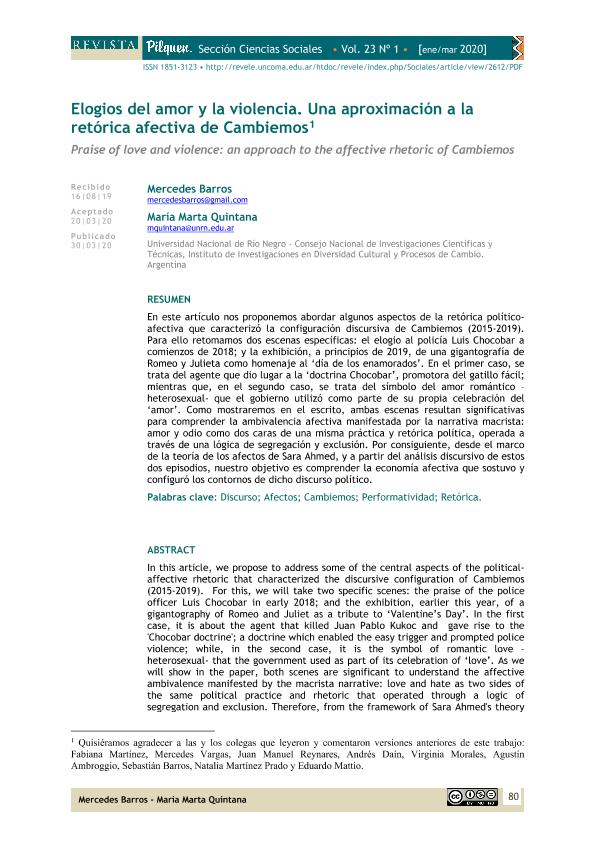Artículo
En este artículo nos proponemos abordar algunos aspectos de la retórica políticoafectiva que caracterizó la configuración discursiva de Cambiemos (2015-2019). Para ello retomamos dos escenas específicas: el elogio al policía Luis Chocobar a comienzos de 2018; y la exhibición, a principios de 2019, de una gigantografía de Romeo y Julieta como homenaje al ‘día de los enamorados’. En el primer caso, se trata del agente que dio lugar a la ‘doctrina Chocobar’, promotora del gatillo fácil; mientras que, en el segundo caso, se trata del símbolo del amor romántico – heterosexual- que el gobierno utilizó como parte de su propia celebración del ‘amor’. Como mostraremos en el escrito, ambas escenas resultan significativas para comprender la ambivalencia afectiva manifestada por la narrativa macrista: amor y odio como dos caras de una misma práctica y retórica política, operada a través de una lógica de segregación y exclusión. Por consiguiente, desde el marco de la teoría de los afectos de Sara Ahmed, y a partir del análisis discursivo de estos dos episodios, nuestro objetivo es comprender la economía afectiva que sostuvo y configuró los contornos de dicho discurso político. In this article, we propose to address some of the central aspects of the politicalaffective rhetoric that characterized the discursive configuration of Cambiemos (2015-2019). For this, we will take two specific scenes: the praise of the police officer Luis Chocobar in early 2018; and the exhibition, earlier this year, of a gigantography of Romeo and Juliet as a tribute to ‘Valentine’s Day’. In the first case, it is about the agent that killed Juan Pablo Kukoc and gave rise to the 'Chocobar doctrine'; a doctrine which enabled the easy trigger and prompted police violence; while, in the second case, it is the symbol of romantic love – heterosexual- that the government used as part of its celebration of ‘love’. As we will show in the paper, both scenes are significant to understand the affective ambivalence manifested by the macrista narrative: love and hate as two sides of the same political practice and rhetoric that operated through a logic of segregation and exclusion. Therefore, from the framework of Sara Ahmed's theory of affections, and from the discursive analysis of these two episodes, the objective of our paper is to understand the affective economy that sustained and configured the contours of this political discourse.
Elogios del amor y la violencia: Una aproximación a la retórica afectiva de Cambiemos
Título:
Praise of love and violence: An approach to the affective rhetoric of Cambiemos
Fecha de publicación:
03/2020
Editorial:
Universidad Nacional del Comahue. Centro Universitario Regional Zona Atlántica
Revista:
Pilquen
ISSN:
1851-3123
Idioma:
Español
Tipo de recurso:
Artículo publicado
Clasificación temática:
Resumen
Palabras clave:
DISCURSO
,
AFECTOS
,
PERFORMATIVIDAD
,
CAMBIEMOS
Archivos asociados
Licencia
Identificadores
Colecciones
Articulos(IIDYPCA)
Articulos de INST. DE INVESTIGACIONES EN DIVERSIDAD CULTURAL Y PROCESOS DE CAMBIO
Articulos de INST. DE INVESTIGACIONES EN DIVERSIDAD CULTURAL Y PROCESOS DE CAMBIO
Citación
Barros, Mercedes María; Quintana, María Marta; Elogios del amor y la violencia: Una aproximación a la retórica afectiva de Cambiemos; Universidad Nacional del Comahue. Centro Universitario Regional Zona Atlántica; Pilquen; 23; 1; 3-2020; 80-92
Compartir




